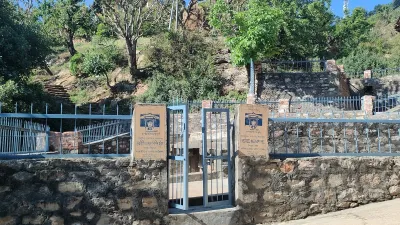Water is predicted by many to be the reason for future conflicts. But are water wars really in our future? SEED magazine asks a panel of experts.
"Now, in UNESCO's third major World Water Development Report, released in March at the World Water Forum in Istanbul, the threat is again plainly stated: 'As climate change and adverse water impacts increase in politically charged areas, conflicts will likely intensify, requiring new and rapid adaptive security strategies.'
Not everyone, however, is convinced that 'water wars' are all they're chalked up to be. In a March 19 essay in Nature, Wendy Barnaby contends, 'Countries do not go to war over water, they solve their water shortages through trade and international agreements.'
According to Barnaby, global trade in 'virtual water'-the water embedded in food products-allows arid countries like those in the Middle East to meet their water requirements without resorting to conflict."
"...As senior government officials convene later this year for World Water Week in Stockholm, how should they be approaching the issue of 'water wars'? Are they an imminent threat or, as Barnaby suggests, a fabrication unsupported by the facts and perpetuated by the media?"
Seed Magazine asks the experts:
* Mark Zeitoun, environmental engineer
* David Hatton, Australia's "water czar"
* Fred Pearce, environmental journalist
* Tobias Siegfried, environmental physicist and international relations scholar
* Michael E. Campana, hydrogeologist
* Sandra Postel, water analyst and author
* Peter Gleick, scientist and global water security expert
FULL STORY: The Truth About Water Wars

Alabama: Trump Terminates Settlements for Black Communities Harmed By Raw Sewage
Trump deemed the landmark civil rights agreement “illegal DEI and environmental justice policy.”

Planetizen Federal Action Tracker
A weekly monitor of how Trump’s orders and actions are impacting planners and planning in America.

The 120 Year Old Tiny Home Villages That Sheltered San Francisco’s Earthquake Refugees
More than a century ago, San Francisco mobilized to house thousands of residents displaced by the 1906 earthquake. Could their strategy offer a model for the present?

In Both Crashes and Crime, Public Transportation is Far Safer than Driving
Contrary to popular assumptions, public transportation has far lower crash and crime rates than automobile travel. For safer communities, improve and encourage transit travel.

Report: Zoning Reforms Should Complement Nashville’s Ambitious Transit Plan
Without reform, restrictive zoning codes will limit the impact of the city’s planned transit expansion and could exclude some of the residents who depend on transit the most.

Judge Orders Release of Frozen IRA, IIJA Funding
The decision is a victory for environmental groups who charged that freezing funds for critical infrastructure and disaster response programs caused “real and irreparable harm” to communities.
Urban Design for Planners 1: Software Tools
This six-course series explores essential urban design concepts using open source software and equips planners with the tools they need to participate fully in the urban design process.
Planning for Universal Design
Learn the tools for implementing Universal Design in planning regulations.
Clanton & Associates, Inc.
Jessamine County Fiscal Court
Institute for Housing and Urban Development Studies (IHS)
City of Grandview
Harvard GSD Executive Education
Toledo-Lucas County Plan Commissions
Salt Lake City
NYU Wagner Graduate School of Public Service




























